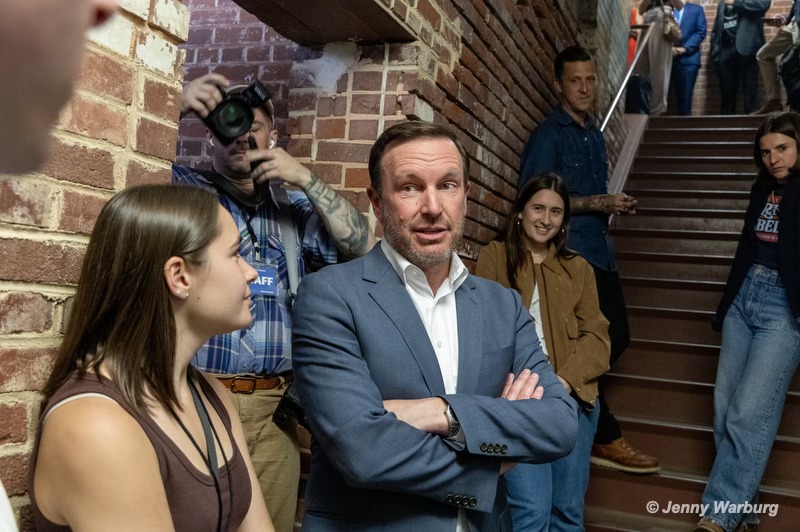Workers Can Say Goodbye to Heat Protections Under Trump
May 1, 2025
How Manosphere Content Placates Disenfranchised Men
May 1, 2025As Trump’s agenda fuels public outrage, Democrats are stepping into GOP strongholds to hold town halls where Republican lawmakers are too afraid, or unwilling, to show up.
One hundred days into Donald Trump’s presidency, the president has the lowest 100-day job approval rating of any president in the past 80 years—and Republican elected officials are getting nervous. Trump’s tariffs are stoking trade wars and price hikes, making recession more and more likely; the price of eggs has never been higher; and the horrors of illegal arrests and mass deportations have made even the most enthusiastic Trump supporters, including Joe Rogan, wary.
As voters in all 50 states feel the effects of federal layoffs, rising prices and cuts to social services—and a far-right agenda that no one voted for—clips of constituents confronting their Republican representatives at rowdy town halls are going viral: Police used a stun gun on two people at a town hall hosted by Rep. Marjorie Taylor Greene (Ga.), while Rep. Mike Lawler (N.Y.) faced boos at one he hosted on April 27.
In response, the National Republican Congressional Committee, chaired by Rep. Richard Hudson (R-N.C.), has advised Republicans in Congress to stop holding in-person town halls with constituents to avoid angry constituents and bad press. (Trump and House Speaker Mike Johnson have also claimed the hecklers are professional protesters Democrats are hiring, but there’s no evidence to suggest this.)

Democrats have been holding town halls in Republican districts where the representative is conspicuously absent. Sens. Chris Murphy (Conn.) and Cory Booker (N.J.) and Reps. Greg Stanton (Ariz.), Greg Casar (Texas) and Maxwell Frost (Fla.) are among the Democrats who have hosted more than 70 “People’s Town Halls” in red districts across 35 states over the past few weeks.
Constituents filled one town hall in Alamance County, N.C.—Rep. Hudson’s district—to over capacity, where state Supreme Court Justice Anita Earls, North Carolina Democratic Party chair Anderson Clayton and North Carolina Minority Leader Robert Reives, among others, spoke to the crowd.
During the town halls, Murphy also films selfie videos for elected officials, saying, “I am here … doing what you refuse to do, which is talk to your constituents,” while constituents chanted, “Where are you?”

Sen. Murphy suggested that the “People’s Town Halls” might flip some seats in the next election cycle.
At a town hall that he hosted in Republican Rep. Ann Wagner’s district in Missouri—which drew 1,200 attendees—he said, “We’re going to make it very clear to Ann Wagner and every other Republican in this country that are hiding from their constituents that if they don’t represent the people that voted them into office, they’re not going to stay in office.”
Besides giving constituents the chance to ask questions that their Republican representative won’t answer, Democrats are hoping to mobilize people’s anger over Trump and Elon Musk’s cuts to federal agencies and services.

Russ Carnahan, chair of the Missouri Democratic Party, said the town hall was “a real opportunity not just to flip a seat here to improve the voice for people in this district, but a real definitive impact nationally when only a handful of seats need to flip to flip the House. To see these enormous crowds around the country coming out and people wondering, will people really come out in this district, I think we answered that today.”
Democrats have also been working to make Trump voters in majority-GOP districts feel included, especially former Trump supporters who are suffering now because of rising costs amid Trump’s economic upheaval.

“If you’re here, and you voted for Trump in the past, my message is simple: I’m sorry you were lied to, but welcome to the team,” said Rep. Frost in Alamance County, N.C.—a county that swung for Trump over Kamala Harris 53-47.
Meanwhile in Florida, angry voters are holding “empty chair town halls,” using chairs as stand-ins for representatives like Kat Cammack (R-Fla.), who has not held a town hall—in person or virtual—since before Trump took office in January.
At the empty chair town hall on April 25, more than 100 voters asked the empty chair questions, which Florida Democratic organizers sent by video to Cammack’s office. Many questions revolved around funding cuts affecting the University of Florida, the largest employer in the region.
On April 27, about 50 people attended another empty chair town hall in High Springs, Fla.
Ebonie Bryant, chair of the Alachua County Democratic Party, told The Guardian, “[Cammack’s] not trying to listen to her constituents, and that’s a problem for the people who elected her. How can you not hear from us, or don’t want to hear from us when we have major concerns?”
Great Job Ava Slocum & the Team @ Ms. Magazine Source link for sharing this story.





